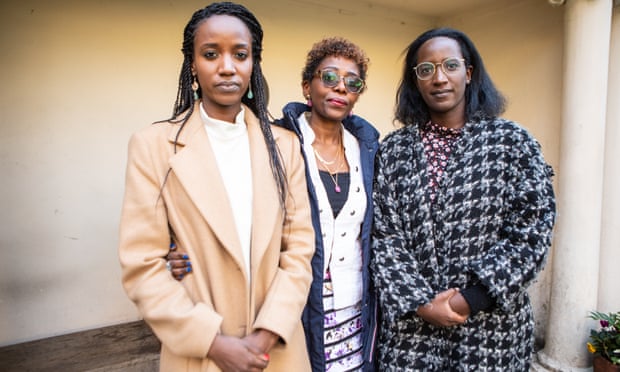Nephew Of Jailed Hotel Rwanda Dissident Hacked By NSO Spyware
The mobile phone of a Belgian citizen who is the nephew of Paul Rusesabagina, a jailed critic of the Rwandan government made famous by his portrayal in Hotel Rwanda, was hacked nearly a dozen times in 2020 using Israeli-made surveillance technology, according to forensic experts at The Citizen Lab.
The findings follow earlier revelations by the Guardian and other media partners in the Pegasus Project, an investigation of Israel’s NSO Group, that Rusesabagina’s daughter, a dual American-Belgian national named Carine Kanimba, was under near-constant surveillance by a client of NSO Group from January to mid-2021, when the hacking attack was discovered by researchers at Amnesty International’s security lab.
The combined findings strongly suggest that the Rwandan government, which has long been suspected of being a client of NSO, deployed a surveillance campaign against Kanimba and her cousin, Jean-Paul Nsonzerumpa, while both were engaged in discussions with senior EU and US officials about Rusesabagina’s case after the activist’s rendition, arrest, and trial in Rwanda, and his current imprisonment.
The new development points to a pattern of transnational repression by Rwanda, which has earlier been linked to the targeting of at least six dissidents living abroad, including Faustin Rukundo, a British citizen who is a member of a Rwandan opposition group and lives in exile and in fear of Rwanda’s security services.
Researchers at the Citizen Lab at the University of Toronto, who are among the world’s experts at detecting surveillance of activists, journalists, and other members of civil society, found that at least one of Nsonzerumpa’s mobile devices had been infected with NSO’s spyware, which is called Pegasus, in October and November 2020. Once a phone is successfully infected, a user of Pegasus can manipulate its camera and microphone, intercept calls, read messages, and track a user’s location.
Rusesabagina has sometimes been referred to as “Africa’s Schindler” after being credited with saving more than 1,000 people during the Rwandan genocide. After leaving Rwanda, he became a vocal critic of President Paul Kagame and was living in the US and Belgium until his arrest by the Rwandan government in 2020. After being forcibly returned to Rwanda and accused of terror-related charges – which Rusesabagina staunchly denies – he is now in prison serving a 25-year sentence.
The US state department recently classified the case as a “wrongful detention”. In January, the FBI included Rwanda in a bulletin about transnational repression against US-based victims, noting that Rwandan officials had “lured” Rusesabagina to Rwanda and reportedly targeted the phones of US-based Rwandan dissidents.
“I watched in horror, last year, as we discovered that my cousin Carine’s phone had been infected with the Pegasus spyware. I felt the need to protect her and our family not knowing that the Rwanda government had also infected my phone and that we were not safe at all,” Nsonzerumpa said.

“Even though the Rwandan government continues to illegally terrorise people everywhere, the US and EU seems afraid to confront this dictatorship,” he added.
His cousin, Kanimba, said in an interview: “It is not shocking to us that his phone was targeted as well. It is shocking that they would spend so much money and resources on two people in the same household.”
Accusations of transnational repression, including by the FBI, do not appear to have halted plans by the UK government to move ahead with the Rwanda scheme for newly arrived asylum seekers.
The plan involves removing asylum seekers who are in the UK and whose claims have been deemed inadmissible by the Home Office and transporting them to Rwanda. The Home Office has not publicly shared its criteria for who is being sent to Rwanda and who is permitted to stay, but asylum seekers who have been selected so far have had strong asylum claims.
While the UK government is in a state of flux the candidates hoping to succeed Boris Johnson all back the Rwanda scheme. The scheme has encountered significant roadblocks and the planned first flight on 14 June was grounded after an interim ruling from the European court of human rights. A high court hearing to determine the lawfulness of the Rwanda scheme is due to take place on 5 September and it is thought unlikely there will be any flights before then.
In a highly unusual move Matthew Rycroft CBE, permanent secretary at the Home Office, sent a letter to the home secretary, Priti Patel, on 13 April this year expressing concern about the scheme. He wrote: “I do not believe sufficient evidence can be obtained to demonstrate that the policy will have a deterrent effect significant enough to make the policy value for money.”
Carine Kanimba, Rusesabagina’s daughter, has said she was in touch with British officials and representatives, including Dame Helena Kennedy, the barrister, before the scheme was revealed. In a statement, she said there has since been an effort by the Conservative government to try to whitewash Rwanda’s human rights record to try to make the scheme more palatable.
Asked about the claims, an NSO Group’s spokesperson said: “Politically motivated organisations continue to make unverifiable claims against NSO hoping they will result in an outright ban on all cyber intelligence technologies, despite their well documented successes saving lives.”
NSO has previously said that it takes allegations of wrongdoing seriously and investigates cases of possible abuse. The company has also said it does not know who is targeted with its spyware once it is in the hands of government clients. It has said that the spyware is only meant to be used to track serious criminals like terrorists and child sex abusers.
A spokesperson for the Rwandan government said: “These are bogus claims. As we pointed out before, Rwanda does not have or use this software. Those making these allegations are simply seeking attention, riding on the ongoing campaign to promote disinformation about Rwanda.”
READ MORE HERE
